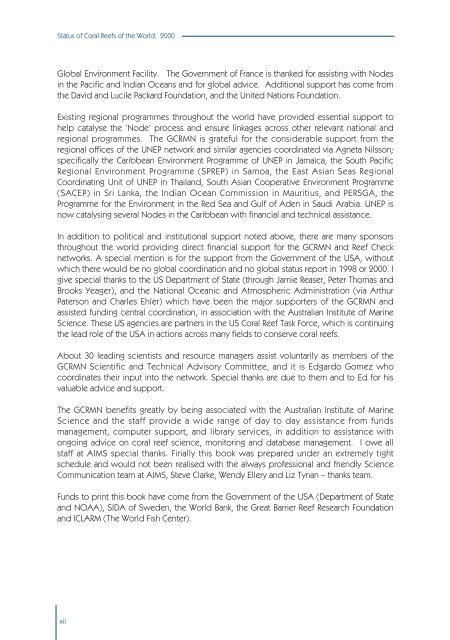Status of Coral Reefs of the World 2000
Status of Coral Reefs of the World 2000.pdf
Status of Coral Reefs of the World 2000.pdf
- No tags were found...
Create successful ePaper yourself
Turn your PDF publications into a flip-book with our unique Google optimized e-Paper software.
<strong>Status</strong> <strong>of</strong> <strong>Coral</strong> <strong>Reefs</strong> <strong>of</strong> <strong>the</strong> <strong>World</strong>: <strong>2000</strong><br />
Global Environment Facility. The Government <strong>of</strong> France is thanked for assisting with Nodes<br />
in <strong>the</strong> Pacific and Indian Oceans and for global advice. Additional support has come from<br />
<strong>the</strong> David and Lucile Packard Foundation, and <strong>the</strong> United Nations Foundation.<br />
Existing regional programmes throughout <strong>the</strong> world have provided essential support to<br />
help catalyse <strong>the</strong> ‘Node’ process and ensure linkages across o<strong>the</strong>r relevant national and<br />
regional programmes. The GCRMN is grateful for <strong>the</strong> considerable support from <strong>the</strong><br />
regional <strong>of</strong>fices <strong>of</strong> <strong>the</strong> UNEP network and similar agencies coordinated via Agneta Nilsson;<br />
specifically <strong>the</strong> Caribbean Environment Programme <strong>of</strong> UNEP in Jamaica, <strong>the</strong> South Pacific<br />
Regional Environment Programme (SPREP) in Samoa, <strong>the</strong> East Asian Seas Regional<br />
Coordinating Unit <strong>of</strong> UNEP in Thailand, South Asian Cooperative Environment Programme<br />
(SACEP) in Sri Lanka, <strong>the</strong> Indian Ocean Commission in Mauritius, and PERSGA, <strong>the</strong><br />
Programme for <strong>the</strong> Environment in <strong>the</strong> Red Sea and Gulf <strong>of</strong> Aden in Saudi Arabia. UNEP is<br />
now catalysing several Nodes in <strong>the</strong> Caribbean with financial and technical assistance.<br />
In addition to political and institutional support noted above, <strong>the</strong>re are many sponsors<br />
throughout <strong>the</strong> world providing direct financial support for <strong>the</strong> GCRMN and Reef Check<br />
networks. A special mention is for <strong>the</strong> support from <strong>the</strong> Government <strong>of</strong> <strong>the</strong> USA, without<br />
which <strong>the</strong>re would be no global coordination and no global status report in 1998 or <strong>2000</strong>. I<br />
give special thanks to <strong>the</strong> US Department <strong>of</strong> State (through Jamie Reaser, Peter Thomas and<br />
Brooks Yeager), and <strong>the</strong> National Oceanic and Atmospheric Administration (via Arthur<br />
Paterson and Charles Ehler) which have been <strong>the</strong> major supporters <strong>of</strong> <strong>the</strong> GCRMN and<br />
assisted funding central coordination, in association with <strong>the</strong> Australian Institute <strong>of</strong> Marine<br />
Science. These US agencies are partners in <strong>the</strong> US <strong>Coral</strong> Reef Task Force, which is continuing<br />
<strong>the</strong> lead role <strong>of</strong> <strong>the</strong> USA in actions across many fields to conserve coral reefs.<br />
About 30 leading scientists and resource managers assist voluntarily as members <strong>of</strong> <strong>the</strong><br />
GCRMN Scientific and Technical Advisory Committee, and it is Edgardo Gomez who<br />
coordinates <strong>the</strong>ir input into <strong>the</strong> network. Special thanks are due to <strong>the</strong>m and to Ed for his<br />
valuable advice and support.<br />
The GCRMN benefits greatly by being associated with <strong>the</strong> Australian Institute <strong>of</strong> Marine<br />
Science and <strong>the</strong> staff provide a wide range <strong>of</strong> day to day assistance from funds<br />
management, computer support, and library services, in addition to assistance with<br />
ongoing advice on coral reef science, monitoring and database management. I owe all<br />
staff at AIMS special thanks. Finally this book was prepared under an extremely tight<br />
schedule and would not been realised with <strong>the</strong> always pr<strong>of</strong>essional and friendly Science<br />
Communication team at AIMS, Steve Clarke, Wendy Ellery and Liz Tynan – thanks team.<br />
Funds to print this book have come from <strong>the</strong> Government <strong>of</strong> <strong>the</strong> USA (Department <strong>of</strong> State<br />
and NOAA), SIDA <strong>of</strong> Sweden, <strong>the</strong> <strong>World</strong> Bank, <strong>the</strong> Great Barrier Reef Research Foundation<br />
and ICLARM (The <strong>World</strong> Fish Center).<br />
xii
















